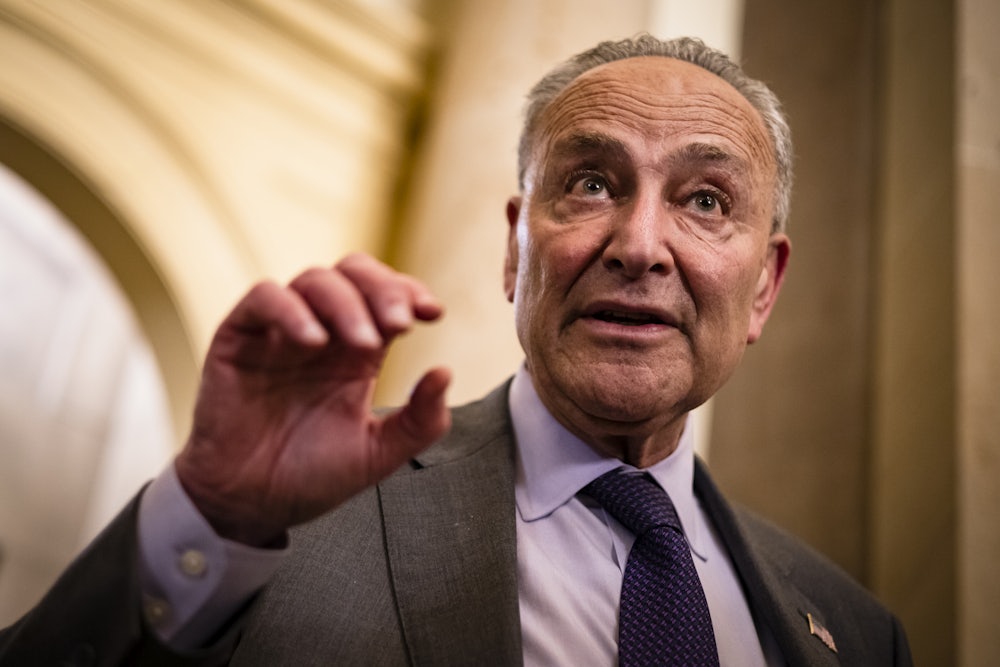It’s not every day that the senate majority leader weighs in on a local fossil fuel infrastructure fight. It’s also not every day that—flanked by democratic socialists—he comes out against fossil fuel infrastructure more generally.
“There is an imperative, not just an option, to stop this plant and to stop all of the expansion of coal, oil, and gas throughout our country and, frankly, throughout our world,” Chuck Schumer said in a press conference Friday outside ConEd’s Astoria Yard generating facility in Queens. Schumer was there to announce his opposition to a controversial gas peaker plant being proposed as an expansion to the same site by energy giant NRG, and opposed for several years by the Democratic Socialists of America and its eco-socialist working group. Schumer was joined by DSA members and several politicians they have helped to elect over more conservative incumbents and establishment picks. The congressman, it seems, isn’t eager to join the ranks of prominent New York Democrats the city’s growing left has defeated.
Schumer also weighed in on his priorities for the infrastructure fight now roiling Congress, including the clean electricity standard, or CES, that several White House officials have recently portrayed as a must-have in a budget reconciliation package. Environmentalists worry that fossil fuel companies may lobby to include gas in such a standard, qualifying it as “clean” alongside wind and solar.
Schumer repeatedly said, at Friday’s presser, that he would oppose counting gas as clean energy in forthcoming CES proposals. Asked by The New Republic whether he would consider including gas a red line, Schumer said he would. “You’ve gotta get to the 80 percent,” he said, reiterating his and the White House’s goal of reaching 80 percent clean power by 2035. “Gas doesn’t help us get there.… I don’t want gas to be in it. Now we have to go to the parliamentarian and get it all worked out, but the number one goal is to get to the 80 percent, period.” He also called for the elimination of fossil fuel subsidies.
While state-level clean energy standards tend to be a regulatory matter, getting such a policy through the U.S. Congress’s reconciliation process would mean structuring it as an incentive program. That means that if a utility meets clean power targets, it would be rewarded. If it doesn’t, it would be penalized. Some versions of a CES could allow gas to fit the definition of clean for several years, potentially opening the door to new gas infrastructure like the proposed NRG plant.
Last week, Greenpeace’s journalistic arm Unearthed released records of a call between Exxon lobbyist Keith McCoy and an undercover Unearthed journalist, in which McCoy argued Exxon wasn’t worried about a potential clean energy standard given the likelihood that it could include gas. If there was an impending CES, he said, “we would probably advocate for natural gas, and I think that is taking hold. We think natural gas would play a key role in anything and not just as a bridge fuel, we think it’s a low-emission energy source and should be part of a clean electricity standard.” Schumer’s statement could cast some doubt on McCoy’s certainty.
Schumer was joined by New York State Senators Jessica Ramos and Michael Gianares, New York State Assembly member Zohran Mamdani, and Tiffany Cabán, who won the Democratic primary for Astoria’s New York City council district last month. Mamdani and Cabán are each members of the Democratic Socialists of America and won with DSA’s endorsement and armies of DSA volunteers. DSA member Representative Alexandria Ocasio-Cortez, whose district includes Astoria, has also circulated a letter among the New York congressional delegation in opposition to the NRG peaker plant. Opposition to the project has also included Food and Water Watch, Sane Energy Project, the Sierra Club, Queens Climate Project, New York Public Interest Research Group, New York Communities for Change, and 350Brooklyn.
NRG argues that the gas-fired plant is necessary to meet growing power demand and that the new project could meet demand more cleanly and efficiently than existing capacity. Yet amid ongoing upgrades to state generating capacity, the New York Independent System Operator found recently that there was no need for the plant, which has now been opened for 60 days of public comment by the state Department of Environmental Conservation in advance of its final decision. State regulators said that the $800 million worth of new transmission lines ConEd is on track to build would allow peaker plants to retire without new fossil fuel plants. “Empirically, at this point, NRG doesn’t have a leg to stand on,” DSA organizer Stylianos Karolidis told me.
As left-leaning primary challengers have picked up seats in recent years, Schumer has grown noticeably more friendly to progressive elected officials and causes—including more ambitious climate policies. Just yesterday, he came out in support of the Civilian Climate Corps being pushed by the youth climate group the Sunrise Movement, as well as Ocasio-Cortez and Senator Ed Markey.
Schumer has not, of course, been reborn as an eco-socialist: He demurred when asked about a DSA-backed push to build public renewable energy infrastructure under the New York Power Authority to replace privately owned fossil power. He also declined to comment on two other proposed gas peaker plants, in the Hudson Valley and Gowanus, Brooklyn, saying that he was still studying them. But at a time when some have wondered whether Schumer could face his own primary challenge for reelection next year, the Senate majority leader’s very presence in the heavily leftist lineup was notable.
Schumer thanked the DSA eco-socialists and allied elected officials against the plant. At the end of their remarks, he joined a chant with advocates present: “Hey hey, ho ho, fossil fuels have got to go.”
